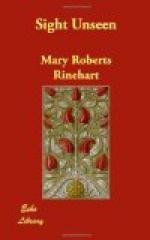I was inclined to agree with him. But the real effect of my brief speech was on my wife.
It was a real compensation for that night of terror and for the uncomfortable time since to find her gaze no longer cold, but sympathetic, and—if I may be allowed to say so—admiring. When at last I sat down beside her, she put her hand on my arm in a way that I had missed since the unfortunate affair of the pharmacy whiskey.
Mrs. Dane then read and explained the two clippings and the letter, and the situation, so far as it had developed, was before the Club.
Were we to go on, or to stop?
Put to a vote, the women were for going on. The men were more doubtful, and Herbert voiced what I think we all felt.
“We’re getting in pretty deep,” he said. “We have no right to step in where the law has stepped out—no legal right, that is. As to moral right, it depends on what we are holding these sittings for. If we are making what we started out to make, an investigation into psychic matters, then we can go on. But with this proviso, I think: Whatever may come of it, the result is of psychic interest only. We are not trailing a criminal.”
“Crime is the affair of every decent-minded citizen,” his sister put in concisely.
But the general view was that Herbert was right. I am not defending our course. I am recording it. It is, I admit, open to argument.
Having decided on what to do, or not to do, we broke into animated discussion. The letter to A 31 was the rock on which all our theories foundered, that and the message the governess had sent to Charlie Ellingham not to come to the Wells house that night. By no stretch of rather excited imaginations could we imagine Ellingham writing such a letter. Who had written the letter, then, and for whom was it meant?
As to the telephone message, it seemed to preclude the possibility of Ellingham’s having gone to the house that night. But the fact remained that a man, as yet unidentified, was undoubtedly concerned in the case, had written the letter, and had probably been in the Wells house the night I went there alone.
In the end, we decided to hold one more seance, and then, unless the further developments were such that we must go on, to let the affair drop.
It is typical of the strained nervous tension which had developed in all of us during the past twelve days, that that night when, having forgotten to let the dog in, my wife and I were roused from a sound sleep by his howling, she would not allow me to go down and admit him.
VIII
On Sunday I went to church. I felt, after the strange phenomena in Mrs. Dane’s drawing-room, and after the contact with tragedy to which they had led, that I must hold with a sort of desperation to the traditions and beliefs by which I had hitherto regulated my conduct. And the church did me good. Between the immortality it taught and the theory of spiritualism as we had seen it in action there was a great gulf, and I concluded that this gulf was the soul. The conclusion that mind and certain properties of mind survived was not enough. The thought of a disembodied intelligence was pathetic, depressing. But the thought of a glorified soul was the hope of the world.




